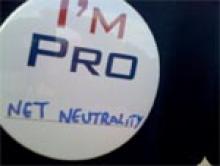Hilarious Video Compares Fiber to the Home with Fiber to the Node
Another great video from Australia makes many salient points regarding the debate over their national broadband network. One key point to take away is that it is possible to talk to non-technical normal people about this subject without overwhelming them or boring them.
Another is that FTTN = fiber to the nowhere, not fiber to the node.
When it comes to building infrastructure, we should make smart long term investments. That said, we are strongly supportive of locally owned, fiber networks. Local ownership trumps national ownership because proximity lends itself to accountability.


